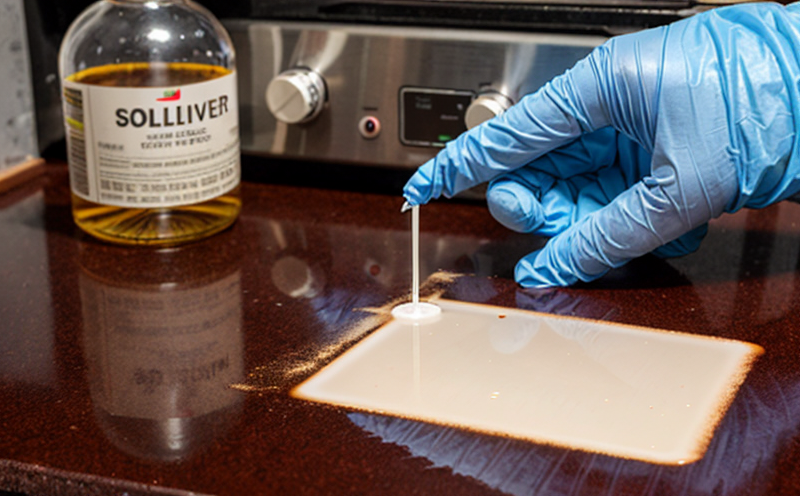Frozen Food Solvent Residue Testing
When it comes to frozen food products, ensuring that they are free from harmful solvents is a critical aspect of quality control. Frozen foods often undergo various processing and packaging steps which can introduce unintended solvent residues into the product. These solvents include substances like ethylene glycol, diethylene glycol (DEG), triethylene glycol (TEG), and other industrial chemicals that could pose serious health risks if present in food.
The presence of these solvents is primarily a concern for manufacturers who use various chemical agents during processing. For instance, certain freezing processes may require antifreeze solutions or other agents which can leave residues behind. In addition to the potential health hazards, the presence of solvents could also lead to flavor and texture issues in the finished product.
At Eurolab, we employ advanced analytical techniques such as Gas Chromatography-Mass Spectrometry (GC-MS), Liquid Chromatography-Mass Spectrometry (LC-MS), and Fourier Transform Infrared Spectroscopy (FTIR) to detect even trace amounts of solvents. Our laboratory adheres strictly to international standards, including ISO 17025, ensuring the reliability and accuracy of our test results.
Our testing process begins with rigorous sample preparation, where we carefully select representative samples from production batches. The samples are then subjected to a series of tests designed to identify any solvent residues present in the product. Once identified, these residues are quantified using precise analytical methods.
The results of our tests are detailed and comprehensive, providing not only the presence or absence of specific solvents but also their concentrations. This information is invaluable for manufacturers looking to ensure compliance with food safety regulations and to maintain product quality.
Our commitment to accuracy and reliability extends beyond just detection; we also offer advice on best practices to minimize solvent residues in frozen food processing. By partnering with Eurolab, companies can not only safeguard their products but also enhance consumer trust and satisfaction.
Why It Matters
The importance of solvent residue testing in the frozen food industry cannot be overstated. The health risks associated with consuming foods contaminated by solvents are significant. These chemicals can cause a range of adverse effects, from gastrointestinal issues to more serious long-term health problems such as kidney and liver damage.
Moreover, the presence of unwanted solvents in frozen foods can lead to compromised product quality. Consumers expect their frozen meals to be safe, tasty, and nutritious, and any trace of harmful chemicals can detract from this expectation. In addition, regulatory authorities around the world are increasingly stringent about food safety standards. Non-compliance with these regulations can result in legal penalties, damage to brand reputation, and loss of consumer trust.
At Eurolab, we understand the critical role our testing plays in maintaining the integrity of frozen foods. Our services help manufacturers ensure that their products meet not only regulatory requirements but also exceed expectations for quality and safety.
Eurolab Advantages
- International Standards Compliance: Eurolab adheres strictly to international standards, including ISO 17025, ensuring the reliability and accuracy of test results.
- Advanced Analytical Techniques: We utilize state-of-the-art instrumentation such as GC-MS, LC-MS, and FTIR to detect even trace amounts of solvents in frozen food products.
- Rigorous Sample Preparation: Our laboratory employs meticulous sample selection processes to ensure that each test is based on a representative batch of the product.
- Detailed Reporting: We provide comprehensive reports detailing not only the presence or absence of solvents but also their concentrations, helping manufacturers make informed decisions.
- Expert Advice: Our team offers valuable insights and recommendations on best practices to minimize solvent residues in frozen food processing.
International Acceptance and Recognition
The results of our solvent residue testing are internationally recognized and accepted by regulatory bodies across the globe. Our adherence to international standards ensures that the tests conducted at Eurolab meet the highest levels of accuracy and reliability.
- ISO 17025: Compliance with this standard guarantees our laboratory’s competence in testing, calibration, and other relevant services.
- ASTM E1980: This standard provides a framework for the analysis of volatile compounds in food packaging materials, which is crucial for ensuring that the packaging used in frozen foods does not introduce unwanted solvents into the product.
- EN 368: European Norm for protective clothing used at work, although this pertains more to personal protective equipment, it underscores our commitment to safety standards.





